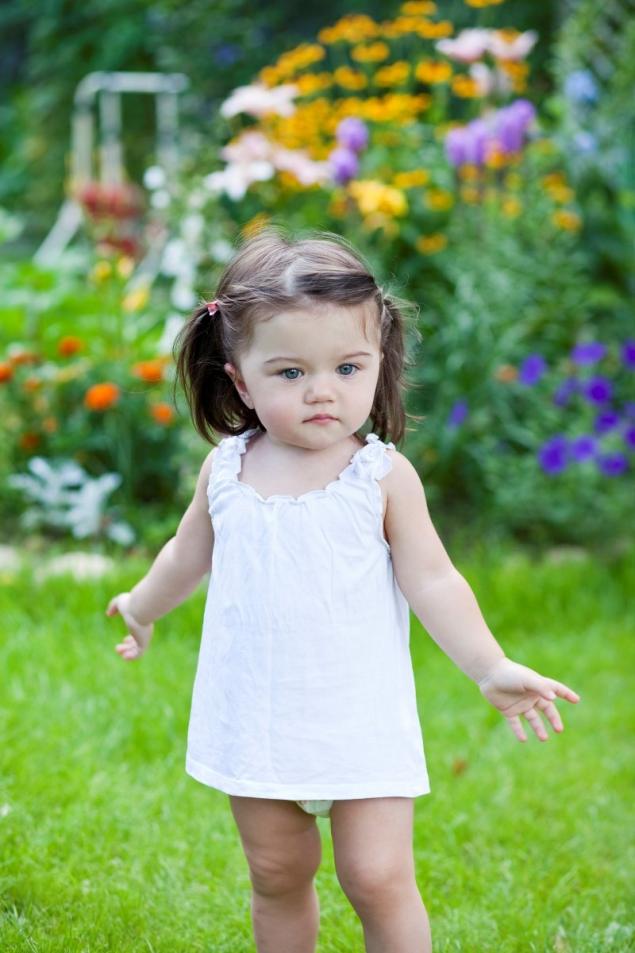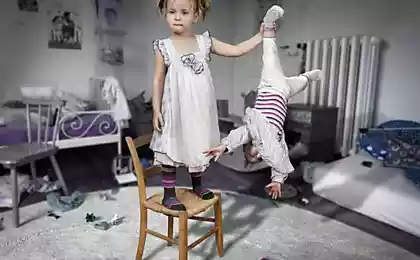162
Every parent should remember... If you punish your child, you have to be prepared.
Most moms and dads are seriously worried about certain things in their children’s behavior. What a loving parent would not be feel helplessIf, for example, his daughter has problems with trust, she is constantly insecure and doubting herself. Or is the son so unpredictable in everything that you start to fear for his future – who will he grow up to be?
You strive to be a good parent and make every effort to properly educate your child. It turns out that you can become a true friend and even a spiritual mentor. To do this, you need to understand your child better and avoid mistakes in education.

DepositPhotos
Deepak Chopra A well-known endocrinologist, writer, author of books on spiritual self-improvement, in particular the book “Seven Spiritual Laws for Parents”, argues that the cause of the problem behavior of a child is a lack of basic needs, insufficient satisfaction of these needs by parents. It looks at 6 age periods in a child’s life and tells how to respond to the behavior shown by children in each period.

DepositPhotos
Features of development and education of children Infancy, up to 1 year
At this time, the baby needs love, tenderness and attention. He wants to be held, touched and played more often, giving him all his time. As a result, the child develops trust - confidence in the good intentions of others.
Basic requirements

DepositPhotos First steps 1 year - 2 years
At this dangerous time, the little man feels separated from his parents for the first time and acknowledges “I am.” He is curious and demands freedom, but not yet sure and afraid. It is important to show your child that the world is safe.
For harmonious spiritual growth of the child is important

DepositPhotos
Kindergarten, 2 years - 5 years
A period of knowledge and testing in a child’s life, his personality expands from “I am” to “I can.” At this stage, he develops a sense of self-esteem, independence and will are formed, he experiences delight, cognizing the world around him, and shows initiative.
Having already learned to use the word “no”, he feels his omnipotence, declares himself by shouting, squealing and defiance. It is dangerous to restrain this energy, it is better to direct it to those tasks and trials that teach balance. By suppressing his sense of strength, you will not grow out of a child a strong, intelligent person ready for any trials.
Consider these. Characteristics of Preschool Children.
Let the baby.

DepositPhotos Preschooler, primary school, 5-8 years
The critical point of this age is primary socialization, the child’s brain is so complex and active that it learns and tests countless different abstract concepts. He loves to share and enjoys the intimacy of another person by letting them into his world.
A sense of security is also directly truthfulness. If a child is lying, he is in danger of punishment and tries to overcome it. Do not resort to punishment, but teach him that it is pleasant to be honest, and praise him for his honesty.
This period must be

DepositPhotos Early adolescence, 8-12 years
This time is most pleasing to parents, because they observe how their children are already developing personality and independence, there are hobbies, likes and dislikes, enthusiasm, love for science or art. Instead of a dictatorship of authority, experience-based learning will now be the most successful.
Don’t set rules, explain to your child “how it works” and “why it happens this way.” Explain to the child that everything should be done so that he feels that it is good.
It will be important at this stage.

DepositPhotos
Early adolescence, 12-15 years
A time when childhood ends and adolescence begins. It is a difficult period of personality creation when the child is no longer a child, but not yet an adult. Childhood innocence is replaced by sexual maturity, and there are needs that parents can no longer satisfy.
The young creature is already characterized by self-awareness, experimentation, responsibility. He is often shy, unstable, emotionally unstable, categorical in his judgments.
At this time, try.

DepositPhotos
Senior adolescence, 15-18 years
Full affirmation of self-awareness and the formation of personality. Now the lessons learned in childhood begin to bear fruit, sweet or bitter. A child who enters the world with the imprints of genuine spiritual knowledge will reflect the pride and trust of his parents.
If you have done well with your role, the foundations of a healthy whole personality are laid in the child. The easiest way to find out if you’ve been successful or not is to see if your child shows inspiration and enthusiasm.
All of the above can be reduced to a single rule: keep these in mind. parenting Give your child as much mature love as you can.
Do you understand your child’s needs? Share the article with your friends and share your opinion in the comments!
You strive to be a good parent and make every effort to properly educate your child. It turns out that you can become a true friend and even a spiritual mentor. To do this, you need to understand your child better and avoid mistakes in education.

DepositPhotos
Deepak Chopra A well-known endocrinologist, writer, author of books on spiritual self-improvement, in particular the book “Seven Spiritual Laws for Parents”, argues that the cause of the problem behavior of a child is a lack of basic needs, insufficient satisfaction of these needs by parents. It looks at 6 age periods in a child’s life and tells how to respond to the behavior shown by children in each period.

DepositPhotos
Features of development and education of children Infancy, up to 1 year
At this time, the baby needs love, tenderness and attention. He wants to be held, touched and played more often, giving him all his time. As a result, the child develops trust - confidence in the good intentions of others.
Basic requirements
- Gone.
- Care.
- Feeding
- Security
- Permanence
- Stability

DepositPhotos First steps 1 year - 2 years
At this dangerous time, the little man feels separated from his parents for the first time and acknowledges “I am.” He is curious and demands freedom, but not yet sure and afraid. It is important to show your child that the world is safe.
For harmonious spiritual growth of the child is important
- Encourage limitless development in the child.
- Learn to value freedom in spite of the injuries.
- Avoid associating his injuries with the fact that he is bad, weak, unable to overcome difficulties or that he is surrounded by dangers.

DepositPhotos
Kindergarten, 2 years - 5 years
A period of knowledge and testing in a child’s life, his personality expands from “I am” to “I can.” At this stage, he develops a sense of self-esteem, independence and will are formed, he experiences delight, cognizing the world around him, and shows initiative.
Having already learned to use the word “no”, he feels his omnipotence, declares himself by shouting, squealing and defiance. It is dangerous to restrain this energy, it is better to direct it to those tasks and trials that teach balance. By suppressing his sense of strength, you will not grow out of a child a strong, intelligent person ready for any trials.
Consider these. Characteristics of Preschool Children.
Let the baby.
- Free to explore and develop.
- Praise, approve, support his initiatives and efforts.
- Put limits within reasonable limits.
- Redirect negative actions instead of suppressing and breaking.

DepositPhotos Preschooler, primary school, 5-8 years
The critical point of this age is primary socialization, the child’s brain is so complex and active that it learns and tests countless different abstract concepts. He loves to share and enjoys the intimacy of another person by letting them into his world.
A sense of security is also directly truthfulness. If a child is lying, he is in danger of punishment and tries to overcome it. Do not resort to punishment, but teach him that it is pleasant to be honest, and praise him for his honesty.
This period must be
- Support the initiative of the child.
- Discover and develop his abilities and talents.
- Identify areas of activity and help achieve success in them.
- Encourage giving, sharing, nonjudgment, acceptance, sincerity.
- Always show love and attention.

DepositPhotos Early adolescence, 8-12 years
This time is most pleasing to parents, because they observe how their children are already developing personality and independence, there are hobbies, likes and dislikes, enthusiasm, love for science or art. Instead of a dictatorship of authority, experience-based learning will now be the most successful.
Don’t set rules, explain to your child “how it works” and “why it happens this way.” Explain to the child that everything should be done so that he feels that it is good.
It will be important at this stage.
- Parental participation
- Understanding
- Support
- Encouraging and rewarding positive initiatives

DepositPhotos
Early adolescence, 12-15 years
A time when childhood ends and adolescence begins. It is a difficult period of personality creation when the child is no longer a child, but not yet an adult. Childhood innocence is replaced by sexual maturity, and there are needs that parents can no longer satisfy.
The young creature is already characterized by self-awareness, experimentation, responsibility. He is often shy, unstable, emotionally unstable, categorical in his judgments.
At this time, try.
- Maintain a trusting relationship with a teenager.
- Be flexible, patient, not categorical.
- Make a deal and compromise.
- Let him feel that he is accepted as he is.

DepositPhotos
Senior adolescence, 15-18 years
Full affirmation of self-awareness and the formation of personality. Now the lessons learned in childhood begin to bear fruit, sweet or bitter. A child who enters the world with the imprints of genuine spiritual knowledge will reflect the pride and trust of his parents.
If you have done well with your role, the foundations of a healthy whole personality are laid in the child. The easiest way to find out if you’ve been successful or not is to see if your child shows inspiration and enthusiasm.
All of the above can be reduced to a single rule: keep these in mind. parenting Give your child as much mature love as you can.
Do you understand your child’s needs? Share the article with your friends and share your opinion in the comments!
The retired learned about the juiciest solutions in interior design! He shares...
Enticing Transformer Sofa and Where to Get It
























